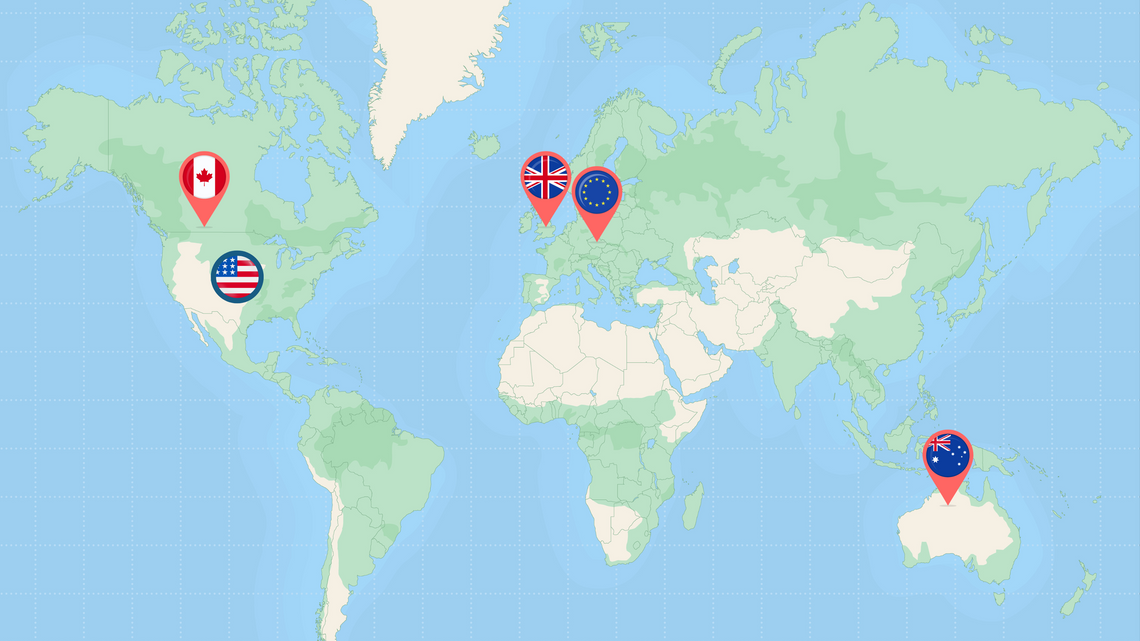With the rise of digital platforms and streamlined logistics, US e-commerce brands are looking beyond their borders to tap into new growth opportunities. As businesses get ready to take their operations international, there are few regions that stand out as particularly promising. We’ll explore some of the best e-commerce markets to consider, including Canada, the European Union, the United Kingdom, and Australia. Each with its own unique regulations, this guide goes over the basics of fiscal compliance and product considerations in every market, providing a comprehensive overview for success in global e-commerce expansion.
Top E-Commerce Markets to Target

1. Canada
Starting your international expansion journey in Canada offers multiple advantages for US-based merchants. With its close proximity and cultural similarities, this country presents a lower-risk international market with significant growth potential. Canada has a highly lucrative e-commerce landscape and consumers who are already familiar with US brands, making the transition smoother compared to other foreign markets. Furthermore, trade regulations, such as the United States-Mexico-Canada Agreement (USMCA), facilitate easier cross-border shipping and lower tariffs. This creates a favorable environment for US businesses to extend their reach without facing some of the complexities and uncertainties that often come with global e-commerce expansion.
Fiscal Compliance
When selling to customers in Canada, there is a 5% goods and services tax (GST) that applies to most transactions. Additionally, some provinces either charge a separate provincial sales tax (PST) typically ranging between 5% – 9.975%, or use a harmonized sales tax (HST) that includes both GST and PST. For carrier (non-postal) shipments from the US to Canada, the tax de minimis threshold is $40 CAD, while the duty de minimis is $150 CAD. Both duty and taxes are accounted for at the border, meaning it’s unlikely that direct-to-consumer (DTC) brands will need to register for a Canadian Tax ID to comply with these regulations.
Product Considerations
It’s important to know if Canada has any prohibitions or restrictions on the products you’ll be importing. Prohibited items cannot be shipped, while restricted ones may require specific licenses, permits, certificates, or other documentation to clear customs.
Here are some common product regulations to consider:
- Cosmetics – To sell beauty or skincare products in Canada, they must comply with the Food and Drugs Act and Cosmetic Regulations. A tool called the hotlist will show you ingredients that are prohibited from use or restricted to certain concentrations. While there are some packaging and labeling policies too, DTC products can often apply the personal use exemption to ship US SKUs to Canadian consumers.
- Health Products – Most supplements and vitamins are exempt from registration requirements in Canada as long as they are for personal use and limited to a supply of less than a 90-days. However, certain ingredients could reclassify the product as a drug, subjecting it to regulation by Health Canada.
- Food – Generally, consumer packaged goods (CPG) food products are eligible for a personal use exemption when importing to Canada as long as they aren’t resold commercially and the amount purchased is below 20 liters or 20 kilograms.
- Pet Products – Importing pet products into Canada, particularly those containing animal-origin ingredients, can be very challenging as food, treats, and compound chews are regulated by the Canadian Food Inspection Agency (CFIA).

2. European Union
As one of the world’s largest markets with access to 27 countries, the European Union (EU) presents a lucrative opportunity for US e-commerce brands looking to expand their global footprint. A stable economy, widespread internet use, and vast customer base make the EU an ideal environment for businesses looking to diversify their market presence and drive international revenue. Additionally, the widespread use of English and the cultural affinity for American products make it easier for US brands to establish themselves in Europe.
Fiscal Compliance
In the EU, value-added tax (VAT) is applied to all imports. Although the European Union provides general guidelines for VAT through its directives, each member state retains the ability to set its own specific rules within this framework. The standard VAT rate across associated countries ranges between 17% – 27%, with an average of 21%. For orders equal to or less than €150 that are shipped Delivered Duty Paid (DDP), the EU offers a streamlined clearance program called Import One-Stop-Shop (IOSS). Registering for an IOSS number allows you to pay taxes on all goods you sell to various EU countries under one monthly return.
Product Considerations
The European Union is known for having stricter rules for product compliance, particularly in terms of labeling, safety, and environmental standards, compared to many other parts of the world. Although achieving 100% compliance can be challenging, it’s often unnecessary for DTC brands. This is because the legal responsibility for adhering to import regulations falls on the consignee, and DTC shipments typically face less scrutiny at customs than B2B imports. Moreover, when local regulatory authorities conduct market surveillance, their focus is primarily on products available on the shelves.
Here are some common product regulations to consider:
- Cosmetics – When selling cosmetics to European consumers, the most important thing is to ensure they are not composed of banned or prohibited ingredients. Selling to retailers or wholesalers will entail much more upfront work. Requirements include product testing, completing safety and manufacturing reports, filing product details, getting labeling and packaging approved, and appointing a responsible person in the EU.
- Health Products – As with cosmetics, vitamins and supplements must not contain prohibited ingredients or ingredients that exceed the allowed concentration level. Selling to retailers and wholesalers will require labels in the local language that list ingredients, nutritional details, dosages, and allergens. It is also important to ensure health claims are substantiated and approved. Depending on the destination country within the EU, a free sale certificate may also be required to prove that they are legally sold in the country of origin and are safe for consumption.

3. United Kingdom
Similar to the EU, the United Kingdom (UK) is an appealing market for e-commerce expansion due to its sizable economy, high internet penetration, and substantial consumer base. This market provides access to four countries – England, Scotland, Wales, and Northern Ireland – through a single customs territory. English being the primary language also reduces the barrier to entry for US-based businesses, simplifying communication and marketing efforts. If you’re considering launching in the EU, including the UK in your plans is a natural strategic move, especially given the closely aligned regulatory environments.
Fiscal Compliance
While VAT payment is mandatory for all imports like in the EU, the UK has distinct regulations that set it apart. For any shipments valued at or under £135, companies are required to collect VAT at checkout and then remit it to HMRC, the UK’s tax authority. For orders exceeding £135, merchants can either collect VAT from customers and arrange for their shipping carrier to pay it upon customs clearance or opt for Delivered Duty Unpaid (DDU) billing terms, where the recipient pays VAT on delivery. We advise using DDP shipping as it provides a better customer experience by including all taxes and duties in the price, preventing unexpected costs and customs delays.
Product Considerations
Although the UK departed from the EU in 2020, it continues to uphold stringent cosmetics regulations that closely reflect those enforced by the European Union. Much like the EU, most products described as nutritional supplements (vitamins, minerals, or amino acids) are regulated as foods in the UK. This means they are subject to the personal import limits for food, which is 2kg for most products. It’s also important to ensure the supplement is safe for human consumption. The UK is particularly vigilant with weight loss and sexual wellness supplements and maintains a list of dangerous products.

4. Australia
Australia is another country that offers a conducive landscape for e-commerce brands looking to grow their international presence. In addition to having a robust economy and digitally proficient population, Australian consumers are known for their willingness to adopt new products, providing a receptive online shopping audience. Moreover, English being the primary language, eliminates potential communication challenges.
Fiscal Compliance
A goods and services tax (GST) of 10% applies to most products sold in Australia. However, the high duty and tax de minimis of $1,000 AUD means shipments valued below this amount will clear free of duties and taxes, including the 10% GST. For shipments valued over $1,000 AUD, duty and tax is collected during the customs clearance process.
While Australia has a substantial de minimis, your brand may be required to register for GST if you surpass a certain sales threshold. Businesses with sales in Australia exceeding $75,000 AUD within any given 12-month period must apply for an Australian GST number. Once registered, you’ll need to collect the 10% GST at checkout for all transactions moving forward and remit it to the Australian Taxation Office. This includes orders valued under the $1,000 AUD de minimis.
Product Considerations
In Australia, nutritional supplements fall under the category of “complementary medicines” and are subject to regulation as non-prescription drugs. Although many common ingredients found in US products are permitted, substances such as Hoodia, Yohimbe, and DHEA are prohibited. When it comes to DTC shipments, an import license is usually not necessary, provided the products are for personal use, the quantity is limited to a three-month supply, and the items are commercially prepared and packaged.
Compliance Solutions for Global E-Commerce Expansion
Partnering with a shipping carrier like Passport, which offers essential compliance expertise and comprehensive international tax solutions, can be pivotal in successfully taking your brand global. Instead of dealing with complex VAT/GST registrations and filings, companies can enroll in a Seller of Record (SOR) program to comply with fiscal regulations in key markets like the European Union (EU), United Kingdom (UK), and Australia (AU). Under the SOR program, merchants can simply collect the required taxes from buyers at checkout, and Passport will take care of clearing shipments. This includes managing VAT/GST returns with the proper authorities and even monitoring sales thresholds that apply to certain countries.
Additionally, you’ll gain access to a team of licensed customs brokers, trade advisors, and regulatory specialists, offering guidance specific to your products. Receiving proper direction around import rules in each market can ensure a smooth shipping experience and prevent costly customs holds or rejections. Passport allows brands to focus on what they do best: creating products that resonate with consumers worldwide while leaving the intricacies of international shipping and trade compliance in capable hands. Ready to start your e-commerce expansion journey? Get in touch with our team here.




